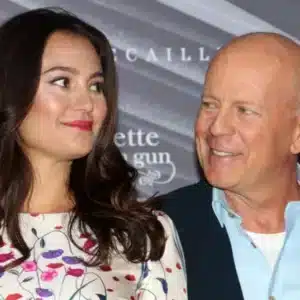As longtime rivals rekindled a decades-old feud that has now reached previously unheard-of heights, the entertainment industry was once again at the center of a political firestorm this week. What started out as a verbal spar has escalated into something much more serious, bringing together some of Hollywood’s biggest stars in unexpected ways and posing important queries about loyalty, citizenship, and the boundaries of presidential authority.
The Most Recent Development in a Legendary Feud
The drama started over the weekend when President Donald Trump delivered what many are describing as his most severe threat to date against an entertainment figure on Truth Social, his preferred platform. The 63-year-old comedian and former talk show host Rosie O’Donnell, who has been an outspoken opponent of Trump for almost 20 years, was the object of his ire.
In his typically direct and provocative post, Trump stated: “I am seriously considering removing Rosie O’Donnell’s citizenship because she is not in the best interests of our Great Country.” If they want her, she should stay in the beautiful country of Ireland because she poses a threat to humanity. America, may God bless you! ”
One of the longest-running celebrity-political feuds in American history has taken a dramatic turn with the threat of citizenship revocation. Given that Trump is currently the President of the United States, the threat has extra weight because it gives what could otherwise be written off as normal social media bluster presidential authority.
The Strategic Relocation and Irish Connection
O’Donnell recently made a calculated move after Trump won the election in November, which has complicated her circumstances. The comedian had already taken action to protect her future by escaping to Ireland as soon as Trump’s second inauguration in January, obviously foreseeing possible confrontations with the incoming administration.
Her relocation to Ireland wasn’t purely symbolic or random. O’Donnell’s father, who left County Donegal for America prior to her birth, has a rightful claim to Irish citizenship. She was able to obtain dual citizenship legally thanks to this family connection, which seems like a wise safety net in light of the current political situation.
Observers are aware of the irony of Trump’s attack, especially considering how closely O’Donnell’s family history resembles his own. O’Donnell, like Trump, was born into a mixed-race family, with one parent being American and the other being foreign-born. This analogy calls into question the coherence of Trump’s views on immigration and citizenship and emphasizes how capricious his criticism is.
In addition to being a sensible safety measure, O’Donnell’s application for Irish citizenship also serves as a metaphor for the extent to which well-known opponents of the Trump administration feel obliged to defend themselves. Her proactive efforts to obtain alternate citizenship options are indicative of a larger trend among public figures and celebrities who perceive the current political environment as potentially endangering their freedom of expression and personal safety.
O’Donnell’s Scathing Reaction
O’Donnell, who never backs down from conflict, reacted to Trump’s threat with his trademark ferocity and defiance. She posted a picture of Trump with the late Jeffrey Epstein, the convicted sex offender whose ties to influential people continue to spark controversy and conjecture, on Instagram, which instantly intensified the dispute.
“Hey Donald – you’re rattled again?,” she wrote in a direct and intimate caption. The comment about living “rent-free” in Trump’s mind highlights the obsessive nature of their feud and implies that O’Donnell finds some satisfaction in continuing to agitate the President almost twenty years after their conflict started. “Eighteen years later and I still live rent-free in that collapsing brain of yours.”
The Epstein photo was purposefully included at a time when the public’s focus has returned to the late financier’s passing and the events surrounding the criminal investigation. The images are particularly controversial and politically charged because of the accusations made by critics that Trump’s administration mismanaged parts of the Epstein investigation.
In a brilliant act of reframing, O’Donnell went one step further and addressed Trump’s description of her as a “threat to humanity.” She embraced the aspects of her identity that she believes Trump finds most frightening: “I am everything you fear: a loud woman, a queer woman, a mother who tells the truth.”
O’Donnell’s comprehension of the more complex dynamics at work in their dispute is evident in this response. In addition to asserting moral authority through her roles as a mother and an advocate for honesty, she positions herself as standing for everything that Trump’s base allegedly opposes by openly identifying as a lesbian woman and truth-teller.
The Pop Culture Warfare and the “King Joffrey” Insult
The most memorable part of O’Donnell’s response was probably her clever insult that compared Trump to “King Joffrey with a tangerine spray tan.” This allusion to the evil young king from George R.R. Martin’s “Game of Thrones” series shows how well-versed O’Donnell is in pop culture messaging and how she can create insults that appeal to a wide range of people.
The character in question, King Joffrey Baratheon, was widely hated by viewers due to his brutality, irrationality, and abuse of authority. According to the comparison, O’Donnell believes Trump is just as despotic and erratic, and that he frequently makes snap decisions that hurt other people in order to satisfy his own desires. The reference to Trump’s “tangerine spray tan” adds a personal, appearance-based element that has become a standard way for critics to make fun of his unusual appearance.
The allusion to “Game of Thrones” also highlights a larger cultural trend in which political discourse is increasingly reliant on metaphors and allusions from entertainment. People like O’Donnell use fictional frameworks to help audiences comprehend real-world power dynamics in a time when traditional political language seems insufficient to convey the surreal nature of modern politics.
Ellen’s Strategic Assistance
Ellen DeGeneres entered this contentious situation and gave her fellow comedian what seemed to be straightforward but important support. With the simple caption, “Good for you @rosie,” DeGeneres posted a screenshot of Trump’s threat and O’Donnell’s response.
Given her own complicated relationship with political controversy and her recent experiences with public criticism, DeGeneres’ response, despite being brief, carries a lot of weight. In recent years, the former talk show host has encountered her own difficulties, such as accusations regarding the culture of the workplace on her program and criticism of her alleged friendship with divisive personalities like George W. Bush.
Given her efforts to repair her reputation after a number of scandals, DeGeneres’ choice to openly back O’Donnell is a calculated risk. DeGeneres shows that she is prepared to take political stances in spite of possible criticism by siding with O’Donnell against Trump, especially from conservative audiences who may already have a negative opinion of her.
Given DeGeneres’ personal recent experiences with political turmoil, the timing of her support is also noteworthy. Following Trump’s election victory in November, the 67-year-old comedian was reportedly one of the celebrities who contemplated leaving the United States. Similar to O’Donnell, DeGeneres temporarily left the country to live in the UK, either for self-defense or as a form of political protest.
The Dimension of LGBTQ+
It is important to consider DeGeneres’ and O’Donnell’s experiences in light of their status as well-known LGBTQ+ celebrities. Since coming out in public in the 1990s, when such disclosures could still result in career termination, DeGeneres has been a trailblazer in the representation of the LGBTQ+ community. In a similar vein, O’Donnell came out in public and has dedicated her professional life to supporting LGBTQ+ rights.
Their unity in the face of Trump’s threats is indicative of the LGBTQ+ community’s larger worries about possible erosions of civil rights safeguards under the current government. LGBTQ+ advocates and celebrities have expressed concern over Trump’s history of opposing LGBTQ+ rights and his administration’s prior policies regarding transgender rights and other issues.
DeGeneres’ decision to back O’Donnell is further supported by her longstanding opposition to Trump’s anti-LGBTQ+ policies. Despite its simplicity, her brief caption reflects her ongoing political opposition to rhetoric and policies that she believes are detrimental to her community.
The Exodus of Celebrities in a Wider Pattern
The reactions of celebrities to Trump’s comeback to power are reflected in the cases of O’Donnell and DeGeneres. Many well-known entertainment personalities have either moved overseas or openly contemplated doing so because they believe the current political environment could be detrimental to their safety and values.
The mass voluntary exile of cultural leaders from their own nation because of political differences is a novel phenomenon in American political culture. The magnitude of actual relocations and citizenship applications is an increase that illustrates the depth of political divisions in modern America, even though celebrity political activism is nothing new.
The complicated decisions that celebrities must make about their personal safety, professional opportunities, and political beliefs are exemplified by DeGeneres’ own brief move to the UK and subsequent apparent return to California. Her recent appearances in Montecito, California, where she has short grey hair and a drastically different appearance, point to someone who has been deeply impacted by recent political events.
The Historical Background of the Trump-O’Donnell Conflict
Understanding that the Trump-O’Donnell dispute dates back almost 20 years and predates Trump’s political career is crucial to comprehending the current escalation. Their conflict started in 2006 when O’Donnell, who was co-host of “The View” at the time, attacked Trump for letting Miss USA Tara Conner retain her title in spite of claims of drug abuse and underage drinking.
O’Donnell’s critique centered not only on Trump’s choice but also on his moral standing in rendering such decisions in light of his own contentious past. Trump’s venomous and individualized response set the stage for a series of conversations that would shape their ongoing dispute.
Their feud’s duration indicates a deeper issue than the usual celebrity arguments. With Trump embodying a more authoritarian approach to handling dissent and O’Donnell representing progressive values and criticism of established power structures, their conflict appears to reflect larger cultural and political divides in American society.
Legal and Constitutional Consequences
Beyond their personal conflict, Trump’s threat to revoke O’Donnell’s citizenship presents significant constitutional and legal issues. Under U.S. law, the authority to revoke citizenship is very restricted and usually necessitates evidence of certain serious crimes, like treason or fraudulent naturalization.
Legal experts have pointed out that under current law, criticizing the President—no matter how severely—does not result in citizenship revocation. Therefore, Americans of all political persuasions should be concerned about Trump’s threat, which either reflects constitutional ignorance or an authoritarian impulse.
Concerns concerning the use of presidential authority as a weapon against specific detractors are also brought up by the threat. Although presidents have a long history of verbally sparring with public figures, including celebrities, the explicit threat of using governmental power to punish critics sets a dangerous precedent that may stifle political dissent and free speech.
Public Reaction and the Media
Commentators from a wide range of political backgrounds have offered their opinions on the incident’s impact, including whether Trump’s threat was appropriate and how well O’Donnell handled it. Although conservative pundits have occasionally voiced unease with the citizenship threat, they have largely supported Trump’s right to disparage O’Donnell. In addition to largely supporting O’Donnell, liberal pundits have used the incident to draw attention to larger worries about the current administration’s authoritarian tendencies.
The response on social media has also been split, with hashtags endorsing both sides trending at different times. With interpretations that mostly follow preexisting partisan lines, the incident has turned into a Rorschach test for general political sentiments.
Conclusion: Politics, Comedy, and Power
Beyond just celebrity drama, the Trump-O’Donnell-DeGeneres triangle reflects underlying tensions in American democracy regarding the boundaries of political criticism, the president’s authority, and the place of entertainers in political discourse. DeGeneres’ straightforward but impactful endorsement, coupled with O’Donnell’s defiant response, implies that some entertainment leaders are still prepared to question presidential authority in spite of the risks.
As this most recent phase of their long-running conflict develops, it serves as a reminder that the lines separating politics and entertainment have mostly blurred in modern-day America. Political disagreements have become intensely personal, and the personal has become political, creating a volatile environment where criticism becomes grounds for exile and comedy becomes resistance.
Beyond the direct participants, this dispute will probably have far-reaching effects that could affect how other celebrities handle political criticism and how the government handles dissent. The Trump-O’Donnell dispute is a case study of the clash between entertainment culture and political power in a time when established norms are continually being challenged, with potentially long-lasting effects on both fields.
Blake, Ethan
Ethan Blake is a talented Creative Content Specialist who has a knack for telling stories that captivate and provoke thought. Ethan brings a distinct viewpoint to his position at TheArchivists, where he curates and creates engaging content for a global audience, thanks to his extensive experience in storytelling and digital content creation.
Ethan graduated with a degree in communications from Zurich University, where he honed his skills in audience engagement, media strategy, and storytelling. He is well-known for his ability to combine originality with exacting analysis, and he is particularly skilled at producing content that engages readers on a deep level in addition to providing entertainment.
Ethan’s specialty at TheArchivists is unearthing gripping tales that capture a diverse spectrum of human experiences. His writing is praised for its originality, genuineness, and capacity to provoke thought-provoking discussions, garnering him admiration from both readers and colleagues.
Ethan is passionate about the craft of storytelling and likes to delve into topics related to history, culture, and personal development. His goal is to inspire and educate with each work he produces. Ethan is committed to leaving a lasting impression and keeps pushing the envelope in the rapidly changing field of digital content.





